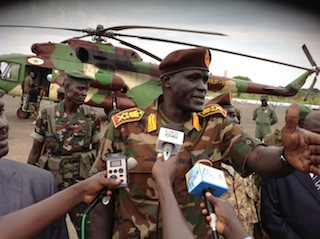South Sudan army gains control of rebel headquarters in Upper Nile
April 28, 2017 (JUBA) – South Sudanese government army (SPLA) Friday has gained control of the headquarters of armed opposition forces, displacing over 25,000 civilians without humanitarian assistance.

The military spokesperson said they were forced to take the town because they have reports that civilians trapped in the rebel-held areas were starving and the government was being blamed for denying humanitarian access to the place.
Ten days ago a group of 10 Shilluk tribal leaders in the Upper Nile accused Olony of killing officers from the Agwelek section of the Shilluk tribe in Panyikang County. The rebel general also belongs to the same tribal section.
Gen. Johnson Colony and his troops joined the SPLA in 2013 when he returned from Sudan after accepting a presidential amnesty. However he joined the SPLM-IO in July 2015.
In April 2015, Johnson Colony defected and captured the capital of the oil-rich Upper Nile state, Malakal, and Melut, headquarters of Melut county which is adjacent to the main oilfields of Paloch, in joint operations with SPLA-IO rebels before the towns were retaken by the government.
The international medical charity Médecins Sans Frontières/Doctors without Borders on Wednesday announced that nearly 25,000 people have been displaced by intense fighting between in Kodok between the government forces and the rebel fighters.
“The humanitarian organisations that have, up until now, been providing essential medical services, water, food, non-food items, and shelter have had to temporarily suspend activities on the west bank of the Nile because of the increasing insecurity,” further said Marcus Bachmann head of MSF mission in South Sudan
The statement expressed deep concern for those who would be forced to trek across the border to Sudan in search of safety in refugee camps if they do not get protection.
(ST)
